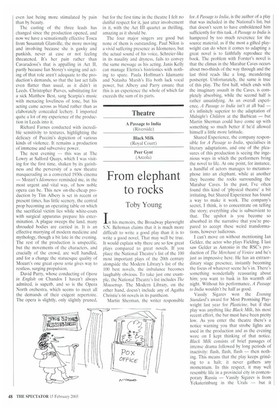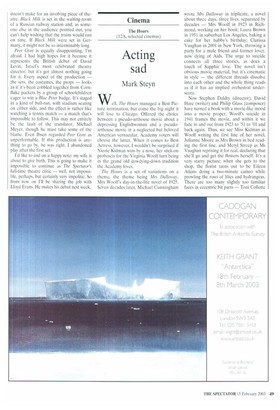Theatre
A Passage to India (Riverside) Black Milk (Royal Court) Peer Gynt (Arcola)
From elephant to rocks
Toby Young
In his memoirs, the Broadway playwright S.N. Behrman claims that it is much more difficult to write a good play than it is to write a good novel. That may well be true. It would explain why there are so few great plays compared to great novels. If you place the National Theatre's list of the 100 most important plays of the 20th century alongside the Modern Library's list of the 100 best novels, the imbalance becomes laughably obvious. To take just one example, the National Theatre's list includes The Mousetrap. The Modern Library, on the other hand, doesn't include any of Agatha Christie's 66 novels in its pantheon.
Martin Sherman, the writer responsible for A Passage to India, is the author of a play that was included in the National's list, but that doesn't seem to have emboldened him sufficiently for this task. A Passage to India is hampered by too much reverence for the source material, as if the most a gifted playwright can do when it comes to adapting a great novel is to faithfully reproduce the book. The problem with Forster's novel is that the climax in the Marabar Caves occurs about two-thirds of the way through and the last third reads like a long, meandering postscript. Unfortunately, the same is true of this play. The first half, which ends with the imaginary assault in the Caves, is completely absorbing, while the second half is rather unsatisfying. As an overall experience, A Passage to India isn't at all bad — it's infinitely superior to the adaptation of Midnight's Children at the Barbican — but Martin Sherman could have come up with something so much better if he'd allowed himself a little more latitude.
Shared Experience, the company responsible for A Passage to India, specialises in literary adaptations, and one of the pleasures of this production is seeing the ingenious ways in which the performers bring the novel to life. At one point, for instance, a handful of actors manages to metamorphose into an elephant, while at another they become the rocks surrounding the Marabar Caves. In the past, I've often found this kind of 'physical theatre' a bit irritating, but Shared Experience has found a way to make it work. The company's secret, I think, is to concentrate on telling the story; everything else is subservient to that. The upshot is you become so absorbed in the narrative that you're prepared to accept these weird transformations, however ludicrous.
I can't move on without mentioning Ian Gelder, the actor who plays Fielding. I last saw Gelder as Antonio in the RSC's production of The Merchant of Venice and he's just as impressive here. He has an extraordinary stage presence, instantly becoming the focus of whatever scene he's in. There's something wonderfully reassuring about him; you want to bask in his warmth all night. Without his performance, A Passage to India wouldn't be half as good.
Vassily Sigarev won the Evening Standard's award for Most Promising Playwright last year for Plasticine, but if that play was anything like Black Milk, his most recent effort, the bar must have been pretty low. As you enter the theatre there's a notice warning you that strobe lights are used in the production and as the evening wore on I kept thinking of that notice. Black Milk consists of brief passages of intense drama followed by long periods of inactivity: flash, flash, flash — then nothing. This means that the play keeps grinding to a halt; it never gathers any momentum. In this respect, it may well resemble life in a provincial city in contemporary Russia — Vassily Sigarev is from Yekaterinburg in the Urals — but it doesn't make for an involving piece of theatre. Black Milk is set in the waiting-room of a Russian railway station and, as someone else in the audience pointed out, you can't help wishing that the trains would run on time. If Black Milk were set in Germany, it might not be so interminably long.
Peer Gynt is equally disappointing. I'm afraid. I had high hopes for it because it represents the British debut of David Levin, Israel's most celebrated theatre director, but it's got almost nothing going for it. Every aspect of the production — the sets, the costumes, the props — looks as if it's been cobbled together from Cornflake packets by a group of schoolchildren eager to win a Blue Peter badge. It's staged in a kind of bull-run, with stadium seating on either side, and the effect is rather like watching a tennis match — a match that's impossible to follow. This may not entirely be the fault of the translator, Michael Meyer, though he must take some of the blame. Even Ibsen regarded Peer Gynt as unperformable. If this production is anything to go by, he was right. I abandoned play after the first set.
I'd like to end on a happy note: my wife is about to give birth. This is going to make it impossible to continue as The Spectator's full-time theatre critic — well, not impossible, perhaps, but certainly very impolitic. So from now on I'll be sharing the job with Lloyd Evans. He makes his debut next week.



































































 Previous page
Previous page